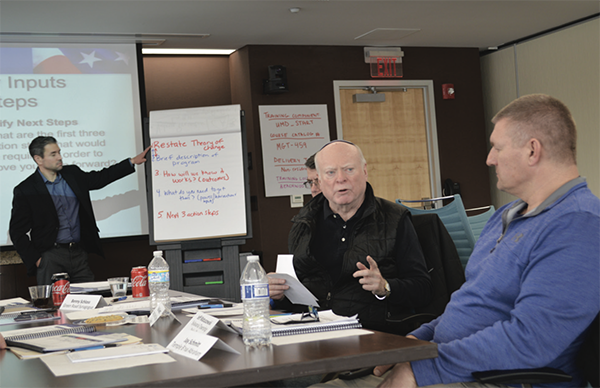03/11/2019
Jewish Federation of Cleveland Takes New Approach to Security
- Share This Story

Paul Gewirtz, second from right, director of security at Young Israel of Greater Cleveland in Beachwood, pitches his group’s idea of an already existing hot line that can be used to report signs of violent extrem- ism during a two-day course designed to prevent would-be threats to the Jewish community. Alyssa Schmitt
Article reprinted with permission from Cleveland Jewish News
by Alyssa Schmitt
Local civic leaders, representatives from synagogues and law enforcement gathered at the Jewish Federation of Cleveland in Beachwood for a two-day course to learn about new methods in countering the threat of violent extremism by changing the narrative of a would-be threat.
The course, “Coalition-Building for CVE and Community Resilience,” took place March 4 and 5 and was developed by the National Consortium for the Study of Terrorism and Responses to Terrorism, or START, to provide community-focused, multi-disciplinary and researched instruction on countering violent extremism. START is a Department of Homeland Security Center of Excellence and the courses are funded by grants from the Federal Emergency Management Agency.
The course is different than previous safety courses the Federation has held in that it focused primarily on the awareness aspect of safety practices, said Jim Hartnett, director of community wide security at the Federation. It promotes the idea that prevention and intervention efforts to address violent extremism or someone being radicalized can be better managed through a community partnership approach.
“This looks more at the symptoms of violent extremism and how we can also have a process for helping to discourage that,” Hartnett said. “This is more the 10,000-foot view of the virus ... out there of anti-Semitism that leads to radicalization. How do we treat the virus so it doesn’t affect our community ...?”
Day one was an awareness raising program based on violent extremism and responses to violent extremism. Day two provided students with the methodology to form their own locally tailored solutions, said William Braniff, director of the National Consortium for the START at the University of Maryland in College Park, Md.
“It’s very much a bottom up kind of philosophy here where we don’t believe we have any of the right answers, we think communities are best positioned to come up with locally tailored solutions,” Braniff said. “What we try to provide them is a rigorous methodology that is used in other scenarios like things like public health that they can use and apply and generate their own solution.”
Near the end of the two days, students of the course were asked to break out into groups and develop their own models to prevent homegrown violent extremism. They had to provide what change they wanted to enact, a brief description of their program, how it could be measured to see its effectiveness and what they needed to get to their desired outcome. Then they were asked to give an elevator pitch to the class and were given feedback from the course presenters and fellow students.
One group came up with a seminar for the general community titled D.A.V.E., similar to D.A.R.E, which stood for defend against violence extremism. It would provide people with the tools and methods to decrease violent extremism on a local level.
Another group pitched an idea to build off of an already existing hot line used for mental health issues, addiction and abuse and to provide training so it could then handle issues of extreme violence. It could be used when schools or families recognize the early signs of someone expressing violence.
The final two groups each pitched programs that could be integrated into schools. One focused on intervention in third through eighth grade by developing an arts curriculum that highlights the value of diversity, inclusion and pluralism while building student’s self-esteem. The other group focused on programs for school assemblies that taught young students the differences in cultures, faith and nationalities.
Going into the course, Paul Gewirtz, director of security at Young Israel of Greater Cleveland in Beachwood, thought it would be more geared toward studying what terrorism looks like today and how to counter it on Jewish holidays. Instead, the course was able to give students a business model for setting up investment justifications of their possible programs.
“Today’s session would not benefit those who are worried about the day-to-day security needs that the Jewish community and Federation has to keep us safe today,” he said. “What this was all about, the last two days, was about activities that we can help develop that would reduce the possibility of violent extremism 10 to 15 or 20 years from now.”
At the end of the two-day course, attendees were able to gain a certificate that said they have been trained in countering violent extremism.

